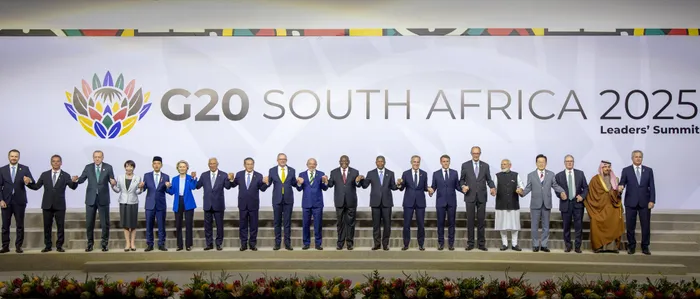G20 Leaders seal landmark agreements on debt, energy, climate and inclusive growth at Joburg Summit
G20

Family Photo of G20 Heads of State and Government; invited Leaders and Heads of International Organizations during the G20 Leaders’ Summit, hosted by South Africa at the Johannesburg Expo Centre.
Image: Supplied/GCIS
South Africa’s Presidency of the G20 culminated in a far-reaching set of agreements as world leaders adopted a comprehensive Declaration in Johannesburg over the weekend, marking the first G20 Summit ever held on African soil.
The declaration, running across global economic governance, debt sustainability, climate action, disaster resilience, food security, technology and inclusive development, positions Africa at the centre of global decision-making while reaffirming the bloc’s commitment to solidarity, equality and sustainability.
Meeting against the backdrop of geopolitical instability, slowing global growth, worsening climate impacts and rising debt distress across the developing world, leaders committed to renewed multilateral cooperation and emphasised the African philosophy of Ubuntu as the guiding ethos of the 2025 Presidency.
A major outcome was the G20’s renewed focus on addressing unsustainable debt levels, particularly in low-income countries.
Leaders endorsed the G20 Finance Ministers’ Declaration on Debt Sustainability and pledged to strengthen the G20 Common Framework to make it more predictable and timely. They also supported crisis-resilient debt clauses, debt-for-climate swaps on a voluntary basis, and greater debt transparency from private and official creditors.
The G20 further backed reforms to the IMF and World Bank, including a quota realignment at the IMF to better reflect global economic realities and the establishment of a new 25th chair to enhance Sub-Saharan Africa’s representation. The group welcomed more than $100 billion in voluntarily channelled Special Drawing Rights for vulnerable economies and supported efforts to expand these mechanisms.
Leaders endorsed measures to accelerate just and inclusive energy transitions, recognising Africa’s inadequate energy access and the global need for diversified, resilient clean-energy supply chains. They supported global targets to triple renewable energy capacity and double energy-efficiency improvements by 2030, while emphasising concessions-based finance and de-risking instruments for developing countries.
A significant breakthrough was the adoption of the G20 Critical Minerals Framework, a voluntary blueprint enabling mineral-rich countries, especially in Africa, to benefit more from their resources through exploration, beneficiation at source, sustainable mining governance and value-chain resilience. The framework aims to shift producer economies away from raw-ore exports and toward industrialisation grounded in local value addition.
With climate impacts intensifying, the G20 placed major emphasis on resilience. Leaders called for universal early-warning systems by 2027, welcomed the Recovery Readiness Assessment Framework developed by South Africa, and endorsed principles for investing in disaster-risk reduction. They reaffirmed their commitment to the Paris Agreement, the 1.5°C temperature pathway and the implementation of the Global Stocktake outcomes.
The declaration underscored the need for trillions in new climate investment, supporting reforms across international financial institutions to channel finance toward developing markets. Leaders also backed the Kunming-Montreal Biodiversity Framework, the Belém COP30 outcomes, and new mechanisms to combat land degradation, forest loss and environmental crime.
With 720 million people facing hunger, the G20 recommitted to resilient and sustainable food systems, open agricultural trade, and expanded support for smallholder farmers.
Leaders endorsed the Ubuntu Approaches on Food Security and Excessive Food Price Volatility, advanced by South Africa, and pledged alignment with Africa’s CAADP and the AfCFTA to boost intra-African agricultural trade, local fertiliser production, seed systems and climate-resilient farming.
Recognising the transformative potential of artificial intelligence, the G20 adopted measures to ensure safe, transparent and equitable AI deployment. They backed the new UNESCO Technology Policy Assistance Facility, the AI for Africa Initiative, and measures to expand access to computing power, datasets, talent development and sovereign AI capabilities across the continent.
Industrial policy gained renewed prominence with the adoption of voluntary G20 High-Level Principles on Sustainable Industrialisation. Leaders emphasised job creation, strengthened labour institutions, decent work and expanded social protection systems. They also adopted the Nelson Mandela Bay Target to reduce youth NEET rates by 5% by 2030 and the revised Brisbane-eThekwini Goal to close the gender labour-force gap by 25% by 2030.
Leaders reaffirmed their commitment to reforming global governance institutions, including a transformative reform of the UN Security Council to give greater representation to underrepresented regions, particularly Africa. The G20 celebrated the African Union’s full membership and launched the Finance Track Africa Engagement Framework, a lasting legacy of South Africa’s Presidency.
As the G20 prepares to hand the Presidency to the United States in 2026, the Johannesburg Declaration signals a shift toward a more inclusive global order, with Africa taking its place as a central actor in shaping multilateral outcomes.
BUSINESS REPORT